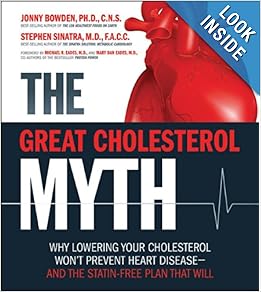If you read last week's newsletter "Heart Disease, out of sight, out of mind?", you might remember this exchange, "now that I have your attention in regard to the impact of heart disease, let's talk about the main contributing factors to this cultural challenge."
"Of course the biggest issue is cholesterol right? BIG FAT NO"
Today we address that "BIG FAT NO!"
I want to start by sending out a special thank you to my good friend and wellness extraordinaire Dr Jonny Bowden for co-authoring the book, The Great Cholesterol Myth with Dr Stephen Sinatra, a well known holistically minded cardiologist. While I have done countless research on cholesterol myself, these two gentlemen took it to another level. Bits and pieces of this article are directly from their book and I would recommend this read to anyone interested in learning about cholesterol and heart disease.
First off, what are some key points to understand in regard to cholesterol?
- Cholesterol is a minor player in heart disease
- Cholesterol levels are a poor predictor of heart attacks
- Half the people with heart disease have "normal" cholesterol levels
- Half the people with elevated cholesterol have healthy hearts
- Lowing cholesterol has extremely limited benefits
So is cholesterol really the "bad guy" and if cholesterol is not the big challenge with heart disease, what is?
Again, if you remember from last week, we mentioned stress, inflammation and oxidative damage as the main causes but there are more. The are other areas to address:
- Don't smoke
- Drink alcohol in moderation
- Engage in moderate to vigorous exercise for at least half hour per day on average
- Maintain a healthy weight with a BMI under 25
- Eat a wholesome, low glycemic, low sugar diet with plenty of omega 3's and fiber
We have been taught that HDL is the good cholesterol because it removes the LDL or so called bad cholesterol. When reviewing your HDL results, you would like to see these above 60 per Dr Bowden and Dr Sinatra, while I have been saying at least 55. Maintaining a healthy weight, physical activity and a diet that includes health fats is believed to keep HDL levels higher.
The "new" information on HDL tells us that these levels are more tightly controlled by genetics. A study in 2011 showed that raising HDL did nothing to protect against heart attacks, stroke or death. It is now known that there are two different types of HDL (HDL-2 and HDL-3) and while number 2 is protective and anti-inflammatory, number 3 is actually inflammatory. With this said, the function of the HDL rather than the straight number is most important.
Now for LDL or the "bad" cholesterol. This was thought to be "bad" because it would build up in the arteries and impede blood flow and it's levels should be low. Too much saturated fat, inactivity and being overweight were thought to be the most significant contributing factors.
So here's the "new" info on LDL. First off, all LDL is not the same. The LDL-A does no harm unless it is damaged by oxidation. The LDL-B is the culprit that promotes atherosclerosis. There is also a Lp(a) which is highly anti-inflammatory and provides much of the repair and restoration of damaged blood vessels. However, if the need for repair is chronic this can lead to the promotion of deposits of oxidized LDL into the wall of the vessels and lead to inflammation and eventual plaque build up, while also promoting the formation of blood clots.
I think you can recognize one word that continues to come up in these conversations. That word is oxidation. Obviously reducing oxidative damage is very important in regard to LDL's and heart disease as discuss in last week's newsletter.
So with this new information, what do you want to look at?
If you really want to know what's going on with your cholesterol and if this is truly an issue, look at the newer particle tests for cholesterol. This would tell you how much of your LDL is type A or B, measure the number of particles and the amount of the potentially dangerous Lp(a).
Another "old" that needs to be replaced is that saturated fat is bad and nutritional cholesterol raises your blood cholesterol levels. This is now shown to be very insignificant from a dietary perspective. Actually the cholesterol that would potentially raise by consuming saturated fat is HDL and the LDL-A, which is the positive LDL. There is actually NO evidence that supports a direct relationship between saturated fat and heart disease. If you go back to the early 1900's when heart disease was virtually non-existent, saturated fat was in very high consumption.
In the end you can see that cholesterol is not the issue we once believed but understanding the breakdown of your cholesterol can also be very education for you.
Remember, for a complete understanding of The Great Cholesterol Myth, I would recommend Dr Bowden's and Dr Sinatra's book. You'll love it!








 Health Coaches, Orange, CA
Health Coaches, Orange, CA
No comments:
Post a Comment